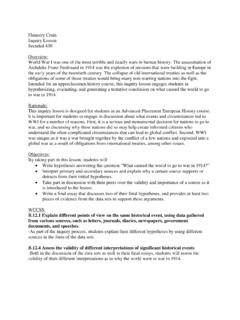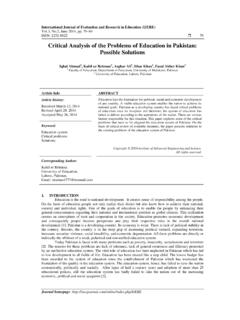Transcription of The terms of the Treaty of Versailles
1 Data Set #3 The terms of the Treaty of Versailles The Treaty can be divided into a number of sections; territorial, military, financial and general. Territorial The following land was taken away from Germany : Alsace-Lorraine (given to France) Eupen and Malmedy (given to Belgium) Northern Schleswig (given to Denmark) Hultschin (given to Czechoslovakia) West Prussia, Posen and Upper Silesia (given to Poland) The Saar, Danzig and Memel were put under the control of the League of Nations and the people of these regions would be allowed to vote to stay in Germany or not in a future referendum. The League of Nations also took control of Germany's overseas colonies. Germany had to return to Russia land taken in the Treaty of Brest-Litovsk.
2 Some of this land was made into new states : Estonia, Lithuania and Latvia. An enlarged Poland also received some of this land. Military Germany s army was reduced to 100,000 men; the army was not allowed tanks She was not allowed an airforce She was allowed only 6 capital naval ships and no submarines The west of the Rhineland and 50 kms east of the River Rhine was made into a demilitarised zone (DMZ). No German soldier or weapon was allowed into this zone. The Allies were to keep an army of occupation on the west bank of the Rhine for 15 years. Financial The loss of vital industrial territory would be a severe blow to any attempts by Germany to rebuild her economy. Coal from the Saar and Upper Silesia in particular was a vital economic loss.
3 Combined with the financial penalties linked to reparations, it seemed clear to Germany that the Allies wanted nothing else but to bankrupt her. Germany was also forbidden to unite with Austria to form one superstate, in an attempt to keep her economic potential to a minimum. Source: Data Set #9 After the collapse of the Austrp-Hungarian Empire at the end of the First World War, the majority of the German speaking people in Austria wanted to unite with the new German Republic. However, this was forbidden by the terms of the Ireaty of Versailles . Demands for the union (Anschluss) of Austria and Germany increased after Adolf Hitler became German Chancellor. In February, 1938, Hitler invited Kurt von Schuschnigg, the Austrian Chancellor, to meet him at Berchtesgarden.
4 Hitler demanded concessions for the Austrian Nazi Party. Schuschnigg refused and after resigning was replaced by Arthur Seyss-lnquart, the leader of the Austrian Nazi Party. On 13th March, Seyss-lnquart invited the Gerrnan_Army to occupy Austria and proclaimed union with Germany. Austria was now renamed Ostmark and was placed under the leadership of Arthur Seyss-lnguart. The Austrian born Ernst Kaltenbrunner was named Minister of State and head of the Schutz Staffeinel (SS). Map of German Speaking Occupied Areas Source: Data Set #8 In October, 1933, Adolf Hitler withdrew Germany from the League of Nations and claimed he had done so because of the failure to reach agreement about disarmament.
5 Hitler argued that under the terms of the Treaty , of Versailles Germany was militarily weak. He said that Germany had been willing to keep to this state of affairs if other countries disarmed. As this had not happened, Germany now had to take measures to protect herself. In the months that followed, Hitler trebled the size of the German Army and completely ignored the restrictions on weapons that had been imposed by the Treaty of Versailles . By 1935, when it was clear that no action was going to be taken against Germany for breaking the terms of the Treaty , Hitler felt strong enough to introduce military conscription. Adolf Hitler knew that both France and Britain were militarily stronger than Germany.
6 However, he became convinced that they were unwilling to go to war. He therefore decided to break another aspect of the Treaty of Versailles by sending German troops into the Rhineland. The German generals were very much against the plan , claiming that the French Army would win a victory in the military conflict that was bound to follow this action. Hitler ignored their advice and on 1st March, 1936, three German battalions marched into the Rhineland. The French government was horrified to find German troops on their border but was unwilling to take action without the support of the British. The British government argued against going to war over the issue and justified its position by claiming that "Germany was only marching into its own back yard.
7 Source: Data Set #7 Hitler s Speech April 12, 1922 AFTER the War production had begun again and it was thought that better times were coming, Frederick the Great after the Seven Years War had, as the result of superhuman efforts, left Prussia without a penny of debt: at the end of the World War Germany was burdened with her own debt of some 7 or 8 milliards of marks and beyond that was faced with the debts of 'the rest of the world' - the so-called 'reparations.' The product of Germany's work thus belonged not to the nation, but to her foreign creditors: 'it was carried endlessly in trains for territorities beyond our frontiers.' Every worker had to support another worker, the product of whose labor was commandeered by the foreigner.
8 'The German people after twenty-five or thirty years, in consequence of the fact that it will never be able to pay all that is demanded of it, will have so gigantic a sum still owing that practically it will be forced to produce more than it does today.' What will the end be? and the answer to that question is 'Pledging of our land, enslavement of our labor-strength. Therefore, in the economic sphere, November 1918 was in truth no achievement, but it was the beginning of our collapse.' Source: Data Set #6 Sudetenland The Sudetenland was part of Germany until 1806 and of the German Confederation between 1815 and 1866. After the First WorkLWar the Sudetenland (some 11,000 square miles) became part of Czechoslovakia.
9 Until Adolf Hitler came to power most Sudenten Germans were content to remain in Czechoslovakia but in 1935 a Sudten-German Party, financed from within Nazi Germany, began to complain that the Czech-dominated government discriminated against them. German's who had lost their jobs in the depression began to argue that they might be better off under Hitler. Adolf Hitler wanted to march into Czechoslovakia but his generals warned him that with its strong army and good mountain defences Czechoslovakia would be a difficult country to overcome. They also added that if Britain, France or the Soviet Union joined on the side of Czechoslovakia, Germany would probably be badly defeated. One group of senior generals even made plans to overthrow Hitler if he ignored their advice and declared war on Czechoslovakia.
10 In September 1938, Neville Chamberlain, the British prime minister, met Hitler at his home in Berchtesgaden. Hitler threatened to invade Czechoslovakia unless Britain supported Germany's plans to takeover the Sudetenland. After discussing the issue with the Edouard Daladier (France) and Eduard Benes (Czechoslovakia), Chamberlain informed Hitler that his proposals were unacceptable. Adolf Hitler was in a difficult situation but he also knew that Britain and France were unwilling to go to war. He also thought it unlikely that these two countries would be keen to join up with the Soviet Union, whose communist system the western democracies hated more that Hitler's fascist dictatorship. Benito Mussolini suggested to Hitler that one way of solving this issue was to hold a four-power conference of Germany, Britain, France and Italy.












